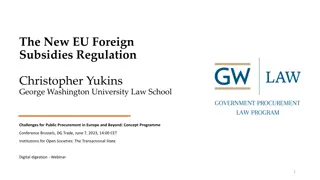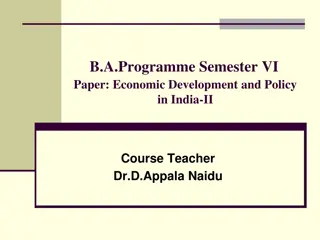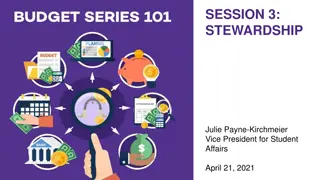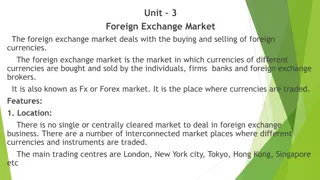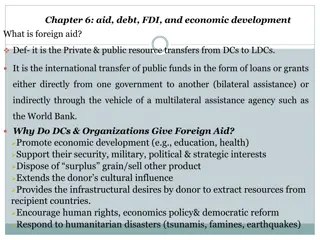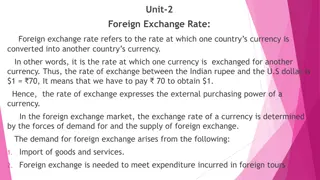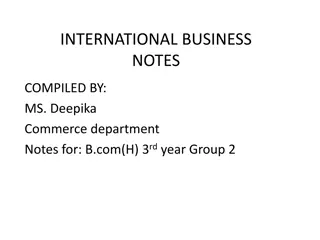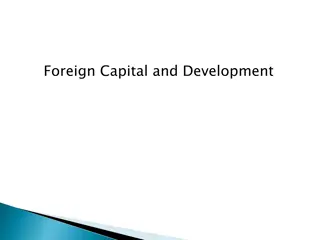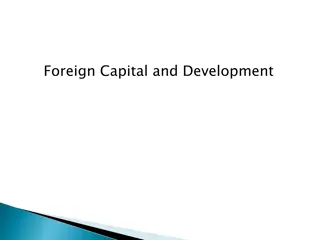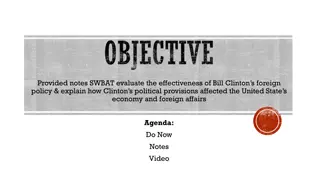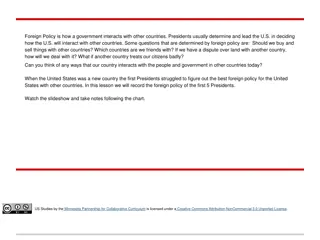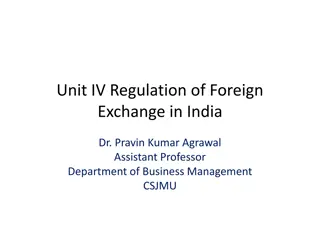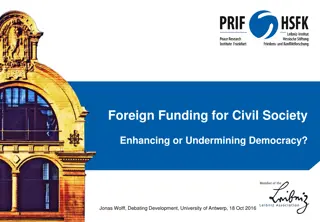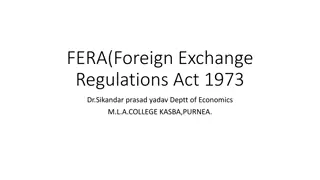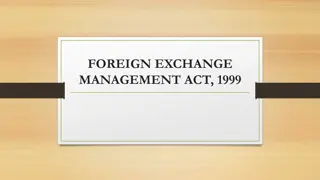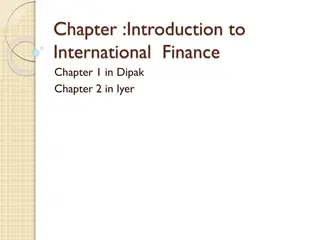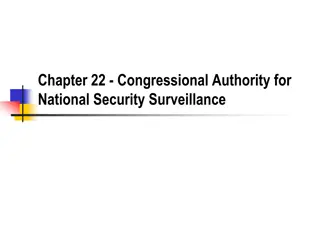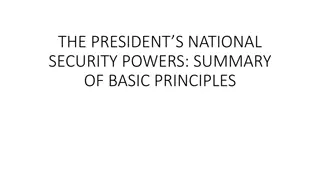Foreign Collaboration
Foreign collaboration refers to partnerships between local and international businesses to leverage technology, research, and economic development. In India, types of foreign collaboration include marketing, financial, technical, and consultancy collaborations, each offering unique benefits for busi
0 views • 5 slides
Department of Home Affairs Quarterly Performance Presentation 2022/2023
Presentation to the Portfolio Committee on Home Affairs featuring the 3rd and 4th quarterly performance reports and budget versus expenditure reports of the Department of Home Affairs for 2022/2023. The report outlines the vision, mission, and value statement of the department, along with its mandat
3 views • 77 slides
Department of Home Affairs 2023/24 Annual Performance Plan Presentation
Presentation of the 2023/24 2nd quarterly performance report and budget versus expenditure report to the Portfolio Committee on Home Affairs. The content includes the vision, mission, and value statement of the Department of Home Affairs, its mandate, outcomes, overall performance for the quarter, p
3 views • 58 slides
Challenges of EU Foreign Subsidies Regulation in Public Procurement
The EU Foreign Subsidies Regulation (FSR) imposes EU State aid rules on foreign vendors in EU Member States, creating disclosure requirements and review processes. This regulation poses administrative burdens and strategic challenges for vendors, particularly impacting EU-based vendors purchasing fr
2 views • 7 slides
Understanding Foreign Capital and Its Role in Economic Development
Governments worldwide strive to attract foreign capital to bridge the gap between domestic savings and planned investments, especially in developing countries like India. Foreign capital inflows, including FDI and loans, play a crucial role in driving economic growth and development. Different types
3 views • 4 slides
IAS Current Affairs
Stay ahead in your IAS preparation with IASexam.com, the ultimate destination for IAS current affairs. Our platform is meticulously designed to provide aspirants with the most up-to-date, relevant, and comprehensive coverage of current affairs crucial for the IAS examination. At IASexam.com, we unde
2 views • 7 slides
Foreign Investments in India: Legal Framework and Investment Routes
Key statutes applicable for foreign investors in India include FEMA, SEBI regulations, and legislations governing securities markets. Foreign investments avenues in India include FDI, FVCI, FPI, NRI investments through SEBI approval or automatic approval route. Foreign Portfolio Investors (FPIs) and
1 views • 54 slides
Anesthetic Management of Bronchoscopy for Airway Foreign Body
This article discusses the anesthetic management of bronchoscopy for airway foreign body, including presentation, preoperative work-up, intraoperative management, and postoperative care. It highlights the incidence of foreign body inhalation, immediate and delayed presentations, findings on chest X-
2 views • 32 slides
Working with International Collaborators: NIH Regional Seminar Overview
Explore key considerations when collaborating with foreign institutions for research projects funded by the National Institutes of Health (NIH). Learn about the significance of international research, NIH's investment strategies, the definition of a foreign component, and application eligibility cri
0 views • 43 slides
Comparing Cambyses and Cyrus: Foreign Policy Perspectives
Explore the contrasting foreign policy approaches of Cambyses and Cyrus, focusing on their views towards foreign peoples, religion, and leadership. Analyze historical evidence to uncover the differences in their treatment of conquered territories and cultures. Evaluate the reliability issues surroun
0 views • 6 slides
Economic Development and Foreign Trade Policies in India
The economic development and policy in India with a focus on foreign trade policies are discussed in this paper. It covers the historical phases of India's trade policy, objectives, and the impact of economic development on foreign trade. The paper also delves into the various theories of foreign tr
0 views • 14 slides
Understanding Stewardship in Student Affairs: Principles and Values
Stewardship in Student Affairs involves effective management and safeguarding of resources like time, money, and people. This session delves into the principles of stewardship, rooted in priorities and values, emphasizing transparency, accountability, and adaptability. It also highlights the Divisio
0 views • 29 slides
Overview of the Foreign Exchange Market
The foreign exchange market, also known as the Fx or Forex market, is a global marketplace for buying and selling foreign currencies. It is decentralized and operates 24 hours a day across various financial hubs worldwide. Major participants include commercial banks, corporates, and entrepreneurs. T
0 views • 27 slides
Understanding Foreign Aid, Debt, FDI, and Economic Development
Foreign aid refers to the transfer of resources from developed countries to less developed countries to promote economic development, support security interests, and address humanitarian needs. Donors give aid for political and economic reasons, with foreign exchange constraints playing a significan
1 views • 31 slides
Understanding Foreign Exchange Rates and Market Forces
Foreign exchange rate is the rate at which one country's currency is converted into another's, reflecting purchasing power. The rate is determined by demand and supply in the foreign exchange market, influenced by factors like imports, exports, investments, and speculation. Equilibrium rate is reach
0 views • 42 slides
Accounting for Foreign Branches: Converting Trial Balances and Exchange Rates
A foreign branch maintains its accounts in a foreign currency, requiring the head office to convert the trial balance into its own currency before finalizing accounts. Fixed and fluctuating exchange rates impact the conversion process, with specific rules for fixed assets, liabilities, and current a
0 views • 7 slides
Understanding Foreign Exchange and Its Impact on Economies and Currencies
Foreign exchange involves converting one country's currency to another, essential for international transactions and travel. This process highlights the significance of local and foreign currencies, exchange rates, and the impact of informal fluctuations influenced by various factors like political
0 views • 15 slides
Understanding International Financial Environment and Foreign Exchange Markets
The international financial system encompasses the management and trading of international money and monetary assets. This involves transactions in foreign currency, foreign deposits, investments, and assets. The foreign exchange market facilitates the exchange of currencies, determining exchange ra
0 views • 20 slides
Understanding Foreign Capital and Its Implications on Development
Foreign capital plays a significant role in the development of a country through investments from foreign governments, institutions, and individuals. It encompasses various forms such as foreign aid, commercial borrowings, and investments that contribute to capital formation, technology utilization,
0 views • 19 slides
Selection and Appointment of Foreign Sales Agents: A Comprehensive Guide
Learn about the process of selecting and appointing foreign sales agents in international marketing, including the meaning of agency, content of foreign sales agency contracts, reasons for appointing agents, factors influencing agent selection, as well as the advantages and disadvantages of working
1 views • 12 slides
Understanding Foreign Capital and Its Impact on Development
Foreign capital encompasses investments from foreign governments, private individuals, and international organizations in a country, including aid, commercial borrowings, and foreign investments. It plays a crucial role in capital formation, technology utilization, and development across various sec
0 views • 19 slides
Understanding Foreign Exchange Rate Systems and Their Impact on Economies
Foreign exchange plays a crucial role in the global economy, representing all currencies other than a country's domestic currency. Different exchange rate systems like fixed, flexible, and managed floating rates have distinct features and implications for trade, capital flows, and macroeconomic stab
1 views • 49 slides
Impact of Bill Clinton's Presidency on the U.S. Economy and Foreign Affairs
Bill Clinton's presidency was marked by a mix of liberal and conservative policies, leading to welfare reform, deficit reduction, and economic growth. His initiatives in balancing the federal budget, cutting government spending, and lowering taxes resulted in a budget surplus and sustained economic
0 views • 11 slides
Analysis of Henry VIII's Foreign Policy Success and Failure
An overview of Henry VIII's foreign policy up to 1547, discussing the shift in his approach during the 1530s and the revival of ambitions in the 1540s. The content explores traditional and revisionist views on Henry's foreign affairs, including his involvement in Scotland and France, alliances with
0 views • 34 slides
Best Foreign Currency Exchange in Tanglin
If you\u2019re looking for a Foreign Currency Exchange in Tanglin, contact Classic Exchange. Their foreign currency exchange company provides reliable, efficient, and competitive foreign exchange services tailored to meet the diverse needs of travele
0 views • 6 slides
Understanding Foreign Policy: The First Five US Presidents
Foreign policy is crucial in how a government interacts with other countries. The first five US Presidents - George Washington, John Adams, Thomas Jefferson, James Madison, and James Monroe - faced challenges in determining the country's foreign policy, dealing with issues like neutrality, isolation
0 views • 28 slides
Foreign-Owned Enterprises (FOEs) in the South Bay
Foreign-Owned Enterprises (FOEs) play a significant role in the South Bay region, contributing substantially to its economy. Foreign firms from developed nations like Japan, UK, and Germany have a strong presence in the area. The concentration of FOEs in cities correlates with improved performance.
0 views • 18 slides
Understanding Foreign Exchange Markets and Risks
Financial managers need to grasp the operations of foreign exchange markets for global business success. These markets allow participants to trade currencies, raise capital, transfer risk, and speculate on currency values. Transactions expose businesses to foreign exchange risk, where fluctuations i
0 views • 40 slides
Foreign Exchange Regulations in India: FERA and FEMA Overview
The Foreign Exchange Regulations in India are governed by acts like FERA and FEMA, aimed at regulating, controlling, and ensuring proper utilization of foreign exchange to promote economic development. FERA, enacted in 1973, was later replaced by FEMA in 2000 to facilitate external trade, payments,
0 views • 42 slides
Foreign Funding for Civil Society: Enhancing or Undermining Democracy?
The discussion revolves around the impact of foreign funding on civil society organizations (CSOs) and democracy. It explores legal restrictions, political targeting, and the trend of limiting foreign funding in approximately 50 countries since 2000. Various case studies from Bolivia, Egypt, Ethiopi
0 views • 10 slides
Challenges Faced in Prioritizing Foreign Language Education
Throughout Europe, foreign language education is emphasized early on in schools, with a high percentage of nations focusing on language learning. In contrast, the United States lags behind in prioritizing foreign language programs in K-12 education, influenced by cultural factors and a lack of aware
0 views • 16 slides
Faculty Governance at Saint Louis University School of Medicine
Explore the faculty governance structure at Saint Louis University School of Medicine, including departmental meetings, committees, Faculty Assembly, Faculty Affairs Committee, and the University Faculty Senate. Learn about the roles of various elected positions, such as the Executive Committee and
0 views • 14 slides
Overview of Foreign Exchange Regulations Act 1973 in India
The Foreign Exchange Regulations Act (FERA) of 1973 in India imposed strict regulations on foreign exchange transactions, payments, and securities dealings. It included restrictions on currency import/export, illegal payments, dealings in foreign exchange, export payments regulated by RBI, bearer se
0 views • 4 slides
Foreign Exchange Management Act, 1999: Overview and Structure
The Foreign Exchange Management Act (FEMA) of 1999 replaced the Foreign Exchange Regulation Act (FERA) and empowers the Reserve Bank of India to regulate foreign exchange transactions. FEMA imposes restrictions on foreign exchange dealings and requires transactions to be conducted through authorized
0 views • 6 slides
Roundtable Discussion on The 19th National Congress of CPC Moderator's Bio
Miaoqiang is a Master of International Affairs, President of Research and Career Development Network for Law and International Affairs. Dr. Flora Sapio, a Board Member of FLIA, is internationally renowned for her analyses in China studies. Larry Backer, Professor of Law & International Affairs, focu
0 views • 8 slides
Understanding Foreign Aid: Types, Features, and Benefits
Foreign aid encompasses economic, technical, or military assistance from one nation to another, aiming at relief, recovery, or mutual protection. It is not solely monetary, including support in various forms like food aid, education, infrastructure, and health care. Types of foreign aid range from p
0 views • 16 slides
Affiliated Societies Meeting HKUST Students Union 2015-2016 Agenda
This document provides details about the Affiliated Societies Meeting of the HKUST Students Union for the year 2015-2016. It covers the agenda items such as introduction, report of orientation affairs, Green O Camp project, important dates for O Camp documents submission, and a Q&A session. It also
0 views • 28 slides
Understanding International Finance: Scope, Importance, and Challenges
International finance explores interactions between countries, including currency exchange rates, foreign direct investment, and risk management. The scope includes foreign exchange markets, MNC financial systems, and international accounting. It raises questions on liberalizing financial markets, I
0 views • 52 slides
Congressional Authority for National Security Surveillance under FISA
The Foreign Intelligence Surveillance Act (FISA) was passed in 1978 in response to abuses outlined in the Church Report. The Foreign Intelligence Surveillance Court (FISC) oversees FISA applications, with the ability for government appeal through the Foreign Intelligence Surveillance Court of Review
0 views • 82 slides
Presidential National Security Powers: Summary of Basic Principles
In Zivotofsky II, the Supreme Court recognized the President's exclusive implied powers despite acknowledging the role of Congress in lawmaking. While the President engages in foreign affairs activities, no general plenary and exclusive foreign affairs power is explicitly vested in the Constitution.
0 views • 9 slides



